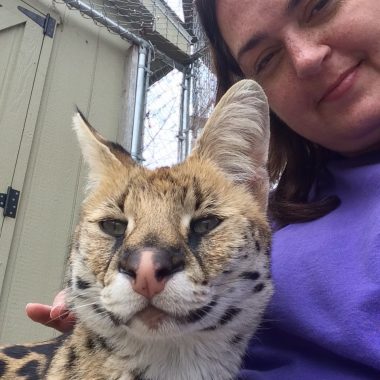This column by Kim Epting, associate professor of psychology, was originally published on the blog of The Conservators Center, a zoological park located in Caswell County.
Views expressed in this column are the author’s own and not necessarily those of Elon University.
—
Professionally, I am an educator, a scholar, a psychologist, a scientist. Beyond my profession, I am a Conservators Center volunteer, tour guide and lifetime adopter. Since beginning as a volunteer at the Center several years ago, I have consistently said that it is my “favorite place,” and that it seems to have a special force field around it that keeps “work thoughts” at bay while I’m there.

As a psychological scientist, I study the connection between language and thought, broadly speaking. My research takes many specific forms and questions, but thinking about this connection—between what we say, think, and do—is professionally of greatest interest to me. The theme of connection extends past my research, yet also invites it into new places.
At work, when teaching classes or mentoring and conducting research, I am connected to the need for education, to the reaction of my students to course material or research design and findings, or to their developing academic interests.
At the Center, I am connected to the ground, to nature, to the animal-ness and biological-ness of myself and the interesting, complex, individual nonhumans in front of me. I am connected to our similarities and differences. Being there, in the presence of those creatures reminds me, perhaps more than any other experience, that I am a biological entity. That’s easy to forget in our industrialized, urban, and increasingly automatized and digitized world: We are biological, natural entities. We are … animals.
As a tour guide, I am connected to how we talk about these nonhumans, about conservation, and about ourselves, and to how visitors react. In that context, it is impossible to detach my psychological scientist and volunteer identities. Thus, with time, the possibility of making yet another connection — doing scholarly research at the Center — became a no-brainer.
With its commitment to connecting people with wildlife and serving conservation through education, the Conservators Center welcomed my research ideas and the opportunity to have students help lead that research. To date, we have conducted five studies, some on-site and some mirrored in the laboratory, on how language chosen for donation opportunities influences donor responses.
I see numerous benefits to this work, all of which rely on making connections — intellectual and/or practical. My students gain invaluable experience designing and conducting experiments, working with community partners, and presenting work professionally. We are challenged to navigate the imperfect balance between better-controlled laboratory studies and applied research in the field, while also balancing research needs with the needs of a living, dynamic organization.
In turn, as researchers, we give back to our community partner by sharing the results of our scientific inquiries that may have direct impact on their efforts as a nonprofit organization. It is enriching for me as a faculty member, for undergraduates who work with me on research and for the Conservators Center.
The research has enhanced connection with my students as well. They have learned about an organization and causes that matter deeply to me as a person, independent of my status as their professor or research mentor. Sharing this vital part of my life with them, I have modeled how to use your professional expertise to bring new meaning or opportunities in your personal interests. Indeed, the connections here are very personal, too.
The short version of the Conservators Center’s mission is to “reconnect people with wildlife,” and certainly the Center has done that for me. Without question, I feel more intimately connected with wildlife—the individual animals at the Center, their species as a whole, and other wildlife I encounter in life and virtually. But it turns out the connections the Center has catalyzed go well beyond that immediate mission.
Becoming involved at the Conservators Center has forged connections to a group of people that are a type of family, bolstered my connection to volunteerism, and enhanced my understanding of nonprofit work and activism. It has deepened my connection to nature and to conservation needs and efforts. It has connected me to resources, to other people and entities at my own university. With it, I have forged connections between my professional work and my personal interests, and have furthered connections with my students through research, classes, and simply sharing with them a place that means something to me.
Ultimately it has connected me more to myself. I am a fuller human in part because of the Center and the connections it has fostered.


